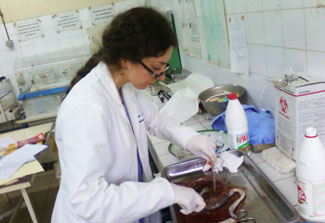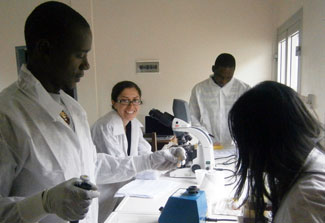Fogarty Fellow Dr Anna Babakhanyan in Cameroon assesses HIV impact in utero
May / June 2015 | Volume 14, Issue 3
By Cathy Kristiansen
The first clinic Dr. Anna Babakhanyan saw in an isolated rural village during a brief trip to Cameroon was dusty and had no electricity or working plumbing. Rather than shy away from the challenges of working in a low-resource environment, she applied for and won a Fogarty fellowship to return to Cameroon and conduct research.

Photo courtesy of Dr. Anna Babakhanyan
As a Fogarty Fellow in Cameroon, Dr. Anna Babakhanyan studied
whether HIV-free babies born to mothers with the virus receive
normal or lower levels of the maternal antibodies that protect
newborns from malaria.
Babakhanyan had dreamed of pursuing a global health career since her childhood in Armenia. Immediately after obtaining her doctoral degree in tropical medicine at the University of Hawaii, she set off for Cameroon. She was funded by Fogarty's Global Health Program for Fellows and Scholars, which provides yearlong mentored clinical research experiences overseas for postdoctoral fellows and pre-doctoral scholars. Also contributing to Babakhanyan's fellowship was NIH's Office of AIDS Research. Her mentors were Dr. Diane Wallace Taylor at the University of Hawaii and Dr. Rose G.F. Leke at the University of Yaoundé 1.
The first hurdle arose even before she boarded the plane for Africa. "The day I was leaving, my professor told me the project I had planned would not work, because an essential instrument, a flow cytometer, had broken and would take months to fix. So I adapted my project."
Once there, while waiting for local study approval, she tested archival plasma samples for immune responses to a malaria antigen, VAR2CSA, which is the target of a candidate vaccine. She had taken with her an instrument for analyzing antibodies in blood and trained Cameroonian students and scientists how to use it. She also learned about managing research in a developing country, as she put together standard operating procedures and handled logistics. "You have to count how many pipettes you are going to need, everything has to be planned ahead. And you need to build a network there of people you can call to share supplies and get other help from. This is something you can't learn just by listening to somebody's lecture, you have to live through it."
Her revised research project sought to clarify whether HIV-free babies born to mothers with the virus receive normal or lower levels of the maternal antibodies that protect newborns from malaria. The number of such babies is rising globally and studies suggest their health is compromised compared with children never exposed to HIV in utero. Neonatal environmental influences such as a sick mother do not account for all the difference.
Babakhanyan conducted a case-controlled study of women with and without HIV, measuring antibodies to malaria and tetanus in their blood and, immediately after the birth, in the placenta and umbilical cord blood. In handling placentas, she was mindful of their high value in Cameroon's traditional ceremonies. "It's very important for women to go back home with the placenta," she said. Yet, it was also imperative to avoid giving them an organ full of HIV-infected blood. Yet, it was also imperative to avoid giving them an organ full of HIV-infected blood. So nurses, according to hospital guidelines, first soaked the placentas in bleach.

Photo courtesy of Dr. Anna Babakhanyan
Dr. Babakhanyan valued the opportunity to mentor Cameroonian
students participating in her project as a part of her fellowship.
Her analysis - so far completed on maternal and cord blood - shows the malaria and tetanus antibody levels are reduced in uninfected newborns delivered by HIV-positive mothers, compared with newborns never exposed to HIV. The mothers themselves, however, had similar antibody concentrations. Current studies are investigating the mechanisms responsible for lower antibody transfer in HIV-exposed babies. Babakhanyan will return to Cameroon briefly for follow-up experiments to determine what might be dampening transplacental transfer of antibodies.
Another valuable aspect of her fellowship, she emphasized, was the opportunity to mentor Cameroonian students participating in her project, who incorporated the study data in their theses and dissertations. Five are co-authors on an abstract she recently submitted at a professional conference, which will be turned into a paper.
Babakhanyan plans to seek an NIH career development grant and ultimately lead studies on new interventions for HIV and malaria. Her Fogarty fellowship was a "tremendous" force in launching her career, she said. "And I am more confident than ever that this is the path for me!"
More Information
To view Adobe PDF files,
download current, free accessible plug-ins from Adobe's website.